Embracing next chapter
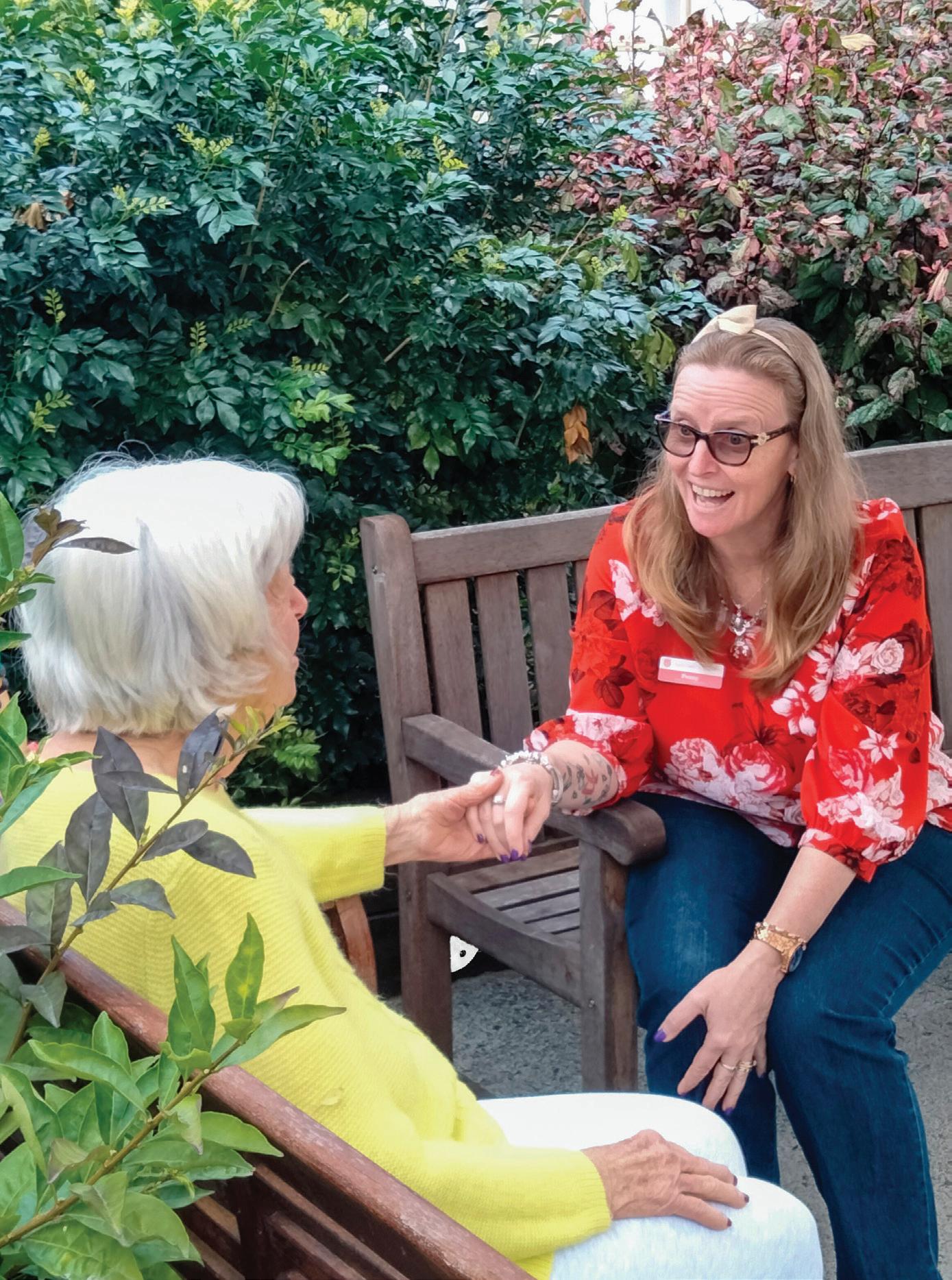
Vol. 003 | No. 34 10 September 2022 AUD $1.00 salvosmagazine.org.au MAGAZINE
life’s
NEWS A jab, a kebab and a place to call home FAITH TALK Speaking in plain English MY STORY Past choices don’t define me Bringing dignity and respect to older Australians DEMENTIA ACTION WEEK 19-25 SEPTEMBER

Every act of kindness you show someone with dementia will be remembered by the heart. The mind may forget but the heart never does.
– Author unknown
What is The Salvation Army?
The Salvation Army, an international movement, is an evangelical part of the universal Christian Church. Vision Statement

Wherever there is hardship or injustice, Salvos will live, love and fight alongside others to transform Australia one life at a time with the love of Jesus.
Mission Statement
The Salvation Army is a Christian movement dedicated to sharing the love of Jesus by:
• Caring for people
• Creating faith pathways
• Building healthy communities
• Working for justice
The Salvation Army Australia acknowledges the Traditional Owners of the land on which we meet and work and pay our respect to Elders, past, present, and future. We value and include people of all cultures, languages, abilities, sexual orientations, gender identities, gender expressions, and intersex status. We are committed to providing programs that are fully inclusive. We are committed to the safety and well-being of people of all ages, particularly children.
Salvos Magazine
Dignity and respect
Dementia Action Week takes place from 19-25 September. Dementia is the second leading cause of death for Australians and the leading cause of death for women. In 2022, around 487,500 Australians are living with dementia (dementia.org.au).
The Salvos operate aged care services throughout Australia, with memory support units and dementia care available to residents. The services focus on treating all residents with dignity and respect, seeing them for who they are, loving them unconditionally and ensuring their condition does not define them.


In this edition, we interview a lifestyle coordinator at one of the aged care centres who shares about her work with the residents there and the fulfilment she receives in helping provide a caring, stimulating and respectful environment for everyone. Ensuring residents are treated with dignity is key.

Enquiry
All other Salvation Army enquiries 13 72 58
Press date 29 August 2022
Cover: Salvos lifestyle coordinator, Penny Palmer, shares a special moment with an aged care resident.
Printed and published for The Salvation Army by Commissioner Robert Donaldson at Focus Print Group, South Granville, NSW.
A couple of aged care chaplains also write about their work offering social, emotional and spiritual support to all residents. The chaplains emphasise their unconditional love and acceptance and recognise people for who they are – just as God loves and accepts us.

For these stories and more, go to salvosmagazine.org.au
Simone Worthing Assistant Editor
The Salvation Army is about giving hope where it’s needed most.
My Story [12] My past choices don’t define me
Faith Talk [10]
Speaking in plain English
Feature [4]
A day in the life of … (03)
CONTENTS
salvosmagazine.org.au
Founders William and Catherine Booth General Brian Peddle Territorial Leaders Commissioners Janine and Robert Donaldson Secretary for Communications and Editor-In-Chief Lieut-Colonel Neil Venables Publications Manager Cheryl Tinker Assistant Editor Simone Worthing Graphic Designer Ryan Harrison Editorial phone
8541 4562
email salvosmagazine@salvationarmy.org.au
A day in the life of …
Bringing dignity and respect to older Australians

Penny Palmer is a diversional therapist and lifestyle coordinator at The Salvation Army’s Riverview Gardens Aged Care Centre near Brisbane. Below, Penny talks about her work looking after senior Australians, including those living with dementia. As Dementia Action Week approaches (19-25 September), Penny emphasises the importance of supporting, respecting and celebrating those living with this condition and those who care for them.
Salvos Magazine: Can you give us an over view of your role?
Penny Palmer: I oversee all the activities for the residents. The centre is quite large, currently accommodating 157 residents. We have three different areas – the hostel, the nursing home, and Fairhaven, the secure dementia or memory support wing. People living with dementia live across all sections, depending on what they need to be safe and what they can do for themselves. Typically, most of our residents in the early-mid stages of dementia are in our hostel and nursing home.
Similarly, there are also residents in Fairhaven at different stages of dementia – again, based on safety and need. There are many different forms of dementia; it’s not just memory loss.
You have been working at Riverview for 22 years. What motivates you to continue in this work?
I simply love what I do. I love being with the residents and working with the fantastic staff. I want to work on how we can support our residents to have a good day and a good life, which is what they need. And to give them the dignity and respect they deserve. I am passionate about my job, and I love being able to give something back to the residents.
What would you like people to know about people living with dementia?
See the person and not their disease. I want to make sure our residents, and their family and friends, see each person living with dementia as a person just like you and
It’s important to not just know people as ‘a person with dementia’.
Taking the residents for walks is part of Penny’s daily routine.
PHOTOS
BY TAMMY SMITH
SALVOS MAGAZINE 4 FEATURE
me – not someone who is defined by their dementia. Nobody should be labelled by their condition – whatever that is.
This is a hard thing for society to change, but it’s such a tragedy for people who have lived rich and wonderful lives to be now known as a person with dementia.
It’s important that families see their loved ones as still being their mum, dad, auntie or uncle, people who have lived their lives and were perhaps engineers or parents who served their communities, loved their gardens, raised children, and so much more.
As staff, we, too, want to get to know each person – what they did in their lives, their family histories, their hobbies, likes and dislikes.
What is a typical day like for you?
I usually come to work when the residents are having breakfast, so I do my rounds, meet and greet everyone and let them know what is happening for the day.
Our team – staff and volunteers – then take those who are part of our walking group on a stroll around our lovely grounds and facilities.
We might then get ready for morning tea or sit and chat. Depending on the day, we roll into our activity after a cuppa. Activities could include a concert, craft, cooking or singalongs.
After lunch, we have a quiet time – we call it ‘twilight time’ – to wind down from the morning. Many of the residents tire quickly by afternoon, or some behaviours start to change. It’s a settling time for them. We find quieter activities for those who don’t rest.
After afternoon tea, it’s a slower-paced and more relaxing activity. This could include a pamper time, adult colouring, movies, reminiscing time, discussions or trivia. It’s not over-stimulating. We find this works well.

Once a week, our chaplain comes and gives a short devotion. Those who can’t attend church on Sundays especially appreciate this.
What are some of the challenges of your work?
Every day can be different, as every person is different. One day a resident could be happy and want to give you a hug, but within a few minutes, their behaviour drastically changes. Someone might have upset them by sitting in ‘their’ seat or making a sudden noise. This can be challenging.
The residents are all individuals in their own ways, and we must adapt to that. We can’t take anything they say or do to heart. We can’t get frustrated or upset – they don’t
Penny loves spending time doing activities with the residents.
Nobody should be labelled by their condition –whatever that is.
5 FEATURE
10 S EPTEMBER 2022
realise they are saying or doing certain things or repeating the same things over and over.
And, of course, there are people without dementia who can be abrupt, rude and diffi cult too. But it is what it is.
What are some of the rewards?
The rewards definitely outweigh the challenges. I love it when our residents are just so happy to be with us – they want to go for walks with us, hold our hands, talk to us. They brighten up my day as much as I hope I brighten theirs.
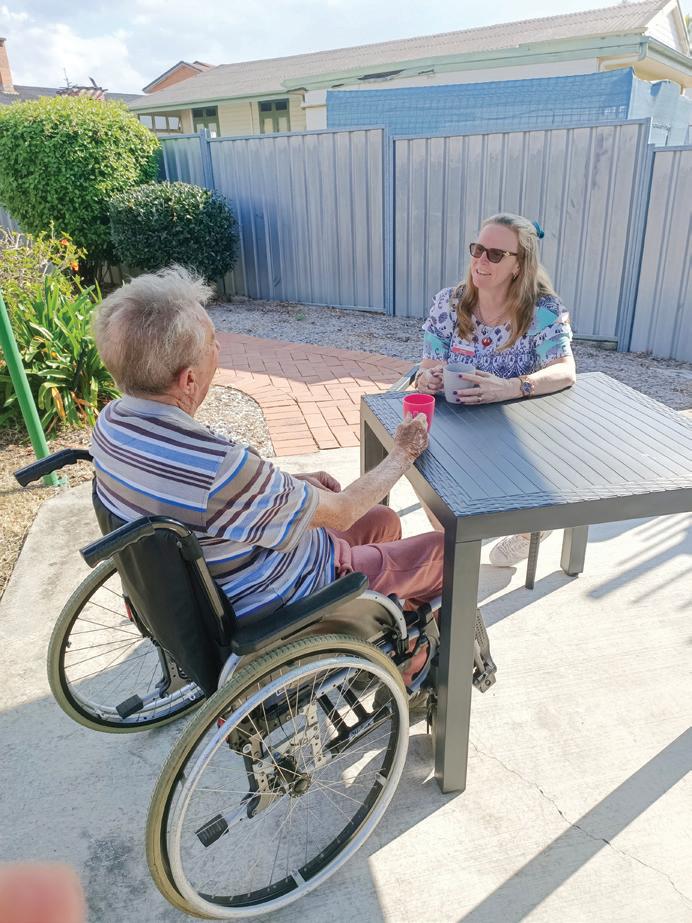
It’s also rewarding to work with and help family and friends of residents who are seeing certain behaviours for the first time and can be extremely daunted or overwhelmed by them.
Working with the fantastic lifestyle team is so rewarding, and it really does take a team to care for people with dementia. Everyone is involved, from the gardeners, cleaners and cooks to the laundry staff, medical team and maintenance crew. It’s important for residents to connect with people from all walks of life.
How has COVID-19 impacted your work?
We can’t hold the bigger events we used to, as we are restricted to numbers and distanc ing. It was very difficult to explain that to the residents.
We had to do a lot more person-centred activities as many residents couldn’t come out of their rooms. It was a huge adjustment to our daily planning.
The staff, especially those in our dementia wing, are amazing and adapted well. Everyone did what they could, so residents still got to go out and do things in small groups.
On a positive note, we had Zoom meetings with families so they could keep in touch with their loved ones. Those who could seldom visit for other reasons were able to connect more frequently. This continues today.
How do you see your work achieving the mission of the Salvos to transform lives?
As a Christian, it’s part of me to show compassion towards other people. I try to do something nice and not expect anything in return. I hope I give joy to people through the day – not just residents but family and staff. I hope they see me as a role model, someone they can talk to if they’re not sure of something or feel down.
I hope I help people, make them laugh, and give appropriate hugs if people are feeling sad. I want residents and staff to have an enjoyable day. I try my best every day to achieve that.
For more information, training opportunities and resources, go to dementia.org.au
Scan here for more information on The Salvation Army Aged Care Services.
Residents enjoy chatting with Penny and her team throughout the day.
SALVOS MAGAZINE 6
FEATURE
Embracing life’s next chapter
The Salvation Army has provided aged care in Australia since 1899. Today, across Australia, there are 21 residential centres, seven retirement villages, one respite centre and multiple Salvos Home Care services. One of the vital services at many of these facilities is chaplaincy.
Chaplains play an important role in Salvation Army Aged Care centres, providing emotional, social and spiritual support to residents based on values including dignity, respect, integrity, diversity and collaboration.


PERSONALISED OPPORTUNITIES
“The Salvation Army Aged Care is a new adventure with new opportunities, where you (residents) can meet new people,” says Cynthia, chaplain at Woodport Aged Care Centre on the NSW Central Coast. “It’s a chance for you to learn more and share your story. I appreciate the opportunity to be there for them, and it’s important to let them know someone’s there to help them.”
our residents and spend time with them. We become good friends with them. Sometimes, as they reach the end of their lives, we might be the only family they have. We pray with them and spend time with them. Some of them may not have a faith process, and that’s okay.
“One lady here is 101 years old. To talk with her about her life experiences and all she has seen is lovely. Getting to know more about our residents is one of my favourite things.”
Janice is a thriving member of the centre. “She loves it and wishes she could’ve done it sooner,” says Linda, Woodport Lifestyle Coordinator who works closely with the chaplains. “The group setting is better, and it’s helped her to improve her independence. It’s made her life a bit more complete.”
GENUINE COMMUNITY
“We become a real community here,” shared Vicki, a chaplain at the Gill Waminda Aged Care Centre in Goulburn, NSW. “We love
Christine, another chaplain at Gill Waminda, said: “One of the gifts that has been given to us is to have Sooty the dog with us. He comforts our residents, and they are very attached to him. He also goes to the hospi tal to see our residents, particularly those with dementia.”
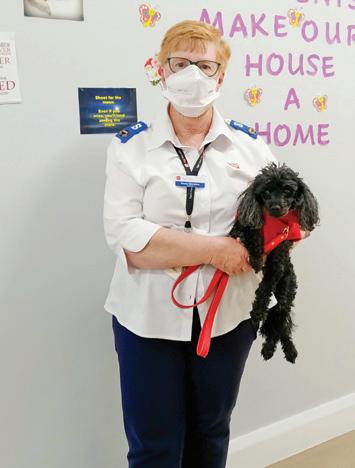
Scan here for more on the need for community.
Christine (with Sooty the dog), left, and Cynthia, chaplains, play an important role in caring for residents.
Residents enjoy a range of interactions with furry and feathered friends in Salvos Aged Care centres.
7
FEATURE
10 S EPTEMBER 2022
Cups of tea, conversations and support for farmers
“It’s amazing what sitting down with a cup of tea does,” said Major ‘Rusty’ Lawson, Rural Chaplain for the Salvos in NSW/ACT. Rusty and his wife, Major Dianne Lawson, are two of six Salvo chaplains who connected with farmers and graziers at this year’s AgQuip event in Gunnedah, NSW, last month. AgQuip is the largest agricultural field day in the Southern Hemisphere.

The Lawsons’ role is to support the members of rural communities, which mainly involves emotional and spiritual conversations. The chaplains have a marquee called ‘The Tent’, which operates as a drop-in centre where people can sit down, have a rest, a cuppa and a chat. Information on other Salvos services is also available.
Most conversations revolve around farming issues, such as the sequence of drought, mice plague, bushfires and the recent floods.
“Our farmers haven’t really had a break for seven to eight years,” Rusty said. “For example, some time ago, after years of no crops, the drought broke, then many farmers had to battle a mice plague that ate their first year’s profits and gnawed on farm equipment, which set off fires, and invaded living spaces.”
This year is particularly wet for many. Cotton crops usually harvested in April are only being harvested now, usually when farmers are plant ing the next crop. Machines can’t access the land, so some farmers will miss another season. While they celebrate the good times, most support involves listening to stories of survival, battling the elements, financial and psycholog ical stressors, and how to keep going.
The chaplains also offer to pray with families, and most agree. Mainland Christian churches are disappearing from the bush, so many appre ciate the contact, encouragement and support.
Dianne and Rusty said they try to follow up after the event, either with home visits, phone calls or catching up for a coffee in their local township. They always try to connect people they meet with their local chaplains, Salvo churches, or additional services.
– Cliff Worthing
Scan here for more on the need for community.
Rusty Lawson shares a cuppa and chat with Craig Tamswell, a farmer from Goonumbla, NSW.
SALVOS MAGAZINE 8 NEWS
A jab, a kebab and a place to call home
For a service built on human interaction, The Salvation Army Homelessness Peninsula team on Victoria’s Mornington Peninsula had to get creative during the past two years. Their Rosebud Rooming House Project went from visiting vulnerable residents at boarding houses to communicating mainly over the tele phone with some restricted outreach support.
“Residents feel like they have no control, living in a state of despair. We provide some basic sustenance, have a chat, and help the person to identify what their immediate needs are,” shares Colm Browne, Rooming House Outreach Worker.
During this time, a collaborative approach between Salvation Army homelessness services on the Peninsula and Victoria East, and the Rosebud Salvos, meant that two basic needs – health and a hearty meal – could be met in an afternoon. And by

partnering with a local food vendor and the Mobile Integrated Health Service (MIHS Van) in May, they invited residents to receive their COVID-19 vaccine and then feast on a kebab.
As restrictions eased, so did the project’s ability to help people. While they couldn’t initially hold cooking sessions in people’s houses, Colm was able to drop and dash food donated or bought at a discounted price from local businesses that pre-make 50 meals for residents every week. Other community support has also increased.
Today, the future is bright for the Rosebud Rooming House Project. Over winter, they ran day trips to the hot springs. And a community grant from the Mornington Peninsula Shire Council means they can now extend outreach to Hastings (Mornington Peninsula).
The Rosebud Rooming House Project is committed to giving people hope – not just a means of survival, but the tools to create a better future. – Jessica Morris
A jab and a kebab, anyone? Salvation Army teams and the Mobile Integrated Health Service gave Rosebud, Victoria, locals a chance to receive a COVID-19 and flu vaccine, a hearty meal and a chat.
9 NEWS
10 S EPTEMBER 2022
Speaking in plain English
When I first heard the term ‘cancel culture’, I realised I had a problem. I had no clue what that meant.
Now I know that language is a concept that changes and adapts, and I had long ago realised that young people have their own way of communicating, but when it’s in adult conversation, that’s another matter. So, expressions like ‘woke’ (alert to injus tice and discrimination in society, especially racism), ‘gaslighting’ (making someone ques tion their reality) and to ‘ghost’ someone (to disappear by not calling, texting or talking to a certain person) have come into our every day speech. Not mine, by the way, but well done if you already knew what they meant.
quick text or tweet and then regret how it’s been perceived?
When I worked as a civil servant, we were encouraged to use plain English when writing to members of the public. Now, of course, whether speaking to someone or writing to them, it’s important that we make our meaning clear so that there is no room for misunderstanding or offence. And how much more important is that when we dash off a
But when it comes to verses in the Bible, they don’t come any plainer than John chapter 3, verse 16: “For God so loved the world that he gave his one and only Son, that whoever believes in him shall not perish but have eter nal life” (New International Version).
Apparently, cancel culture is a social environ ment, including online, where publicly boycotting or withdrawing support for people or organisations regarded as promoting socially unacceptable beliefs is widespread.
Hopefully you find the positive message in that Bible verse a belief that you find person ally acceptable.
Oh, and if that verse specifically spoke to you, please don’t ghost God.
James Burns is a freelance writer from the Dunstable Salvos in the United Kingdom.
When it comes to verses in the Bible, they don’t come any plainer than John chapter 3, verse 16.
Scan here for more on finding meaning.
Not ghosting God if his message speaks to us
Words James Burns
SALVOS MAGAZINE 10
FAITH TALK
 PHOTO BY SURENDRAN MP ON UNSPLASH
PHOTO BY SURENDRAN MP ON UNSPLASH
11
FAITH TALK10 S EPTEMBER 2022
My past choices don’t define me
After a life of drink, drugs and criminal behaviour, when Paul met the Salvos, he received unconditional love
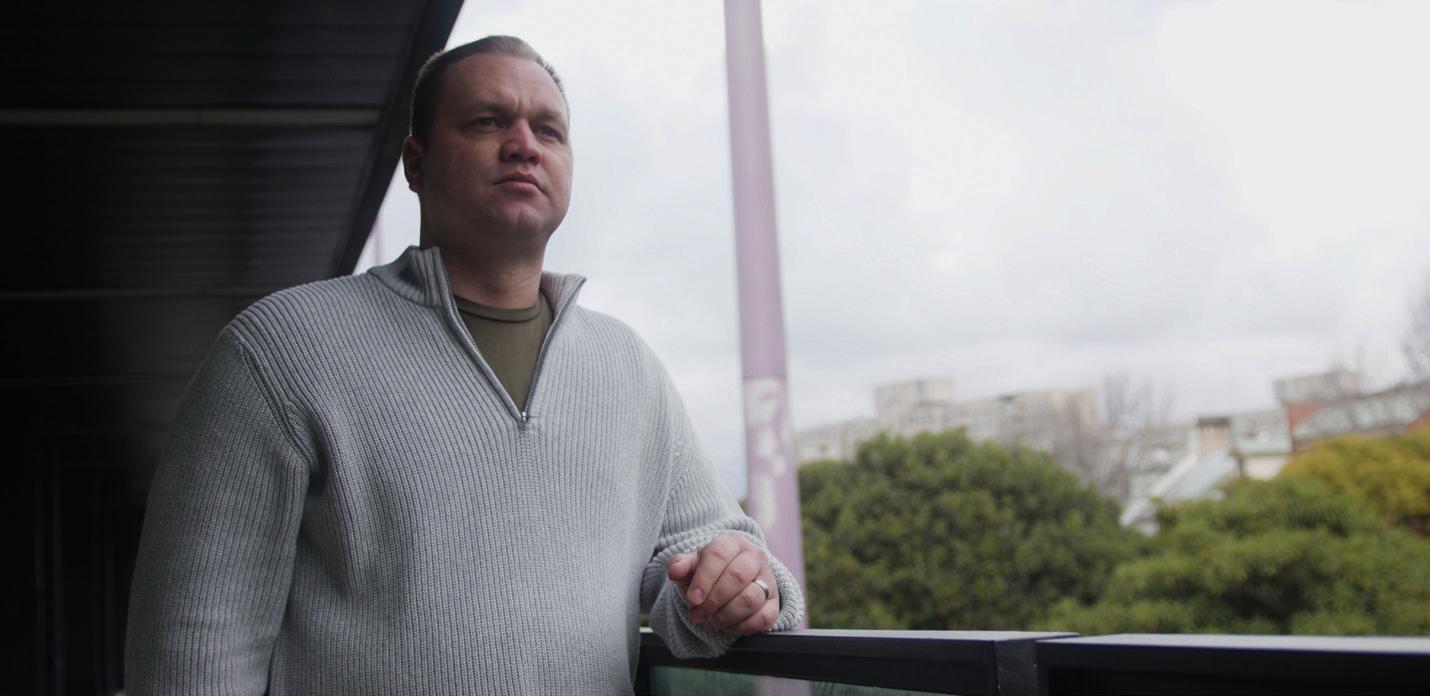 Words Paul
Words Paul
When I was young, I adored being with my father, but one day he just packed up and left. I’m the eldest of four boys, and my three younger brothers kept asking, “Where’s Dad?” I had to try and fill in the gaps, and though I wanted to help them, I found it hard myself to understand what was going on.
Feeling like a fish out of water as I struggled with my emotions and feelings, I turned to drinking and drug-taking. My anti-social behaviour escalated to the point where I’m ashamed to say I took part in a lot of criminal activities while hanging out with like-minded buddies.
I struggled a lot with work because I didn’t like taking directions from others, and I’d often sneak away to have a quick drink or take drugs. I didn’t want to admit to myself that I had a problem. I was hurting other people because I was hurt.
The guys I hung out with didn’t have a good influence on me. When I talked to them about how I felt, they didn’t think I had a problem and reckoned that a real man doesn’t need to seek help. I wanted to show them that I was a strong man capable of looking after myself and fixing my own problems. Everything I was doing just wasn’t enough – I was living on the streets, I was living in the bush, I was living overseas. It wasn’t in my brain or my mind to think that I needed to reach out for help.
REACHING OUT FOR HELP
However, there came a time when I looked at myself in the mirror and realised that I really did have a problem. I realised that I was the one with the issues – it wasn’t society, it wasn’t the people I was surrounding myself with, it was me, and I had to change things if I wanted to have a happy life. Enough was enough.
Paul has worked through some challenging issues to make changes in his life, value himself and enjoy positive outcomes.
SALVOS MAGAZINE 12
MY STORY
Although it wasn’t easy, I chose to admit that I was at rock bottom and had to reach out for help. I went into detox and rehab and completed the recovery programs in order to change and enjoy the life I’m now living.
When I was living in a boarding house down the road from the Rockdale Salvos church, I met a couple of fine, caring people there. They were kind and interested in me, and, despite all my flaws and craziness, they wanted to get to know me. They really lived out the mission of the Rockdale Salvos to help people find fullness of life through faith, love and community.

I was willing to be honest with them, telling them what I was struggling with and what I needed help with. They took me out for a coffee and asked if I needed food and clean clothes, but most of all they gave me a sense of belonging. Not only did they give me their time, but they also gave me unconditional love and positive vibes, reassuring me that my earlier life choices were behind me and are not the ones I’m making today. It’s important for me to be a part of a caring community, and I find that being a member
of the church family is great. I really enjoy meeting with those people – I learn a lot from them, and I have a sense of belonging, so it gives me a positive outlook on life.
Being okay is about a choice, and I have value in myself today. In the evenings, I like to reflect on my day and know that I’ve done the best I can within myself to have a good outcome in my life. It’s all about me being positive and living life in the best way possible.

My earlier life choices were behind me and are not the ones I’m making today.
Scan here for more information on Salvation Army Alcohol and Other Drugs Services
Paul, second from right, with some of the group from the local Salvos who showed an interest in and supported Paul, giving him a sense of belonging and friendship.
13
MY STORY
10 S EPTEMBER 2022
Mukimo

Traditional Kenyan family dish Serves 5
Quick quiz
1. What is the first day of spring called?
2. What happens on this day?
3. The first day of spring marks the beginning of what Persian holiday?
4. What are the first flowers to appear in spring?

5. Who was the first to propose daylight saving time in 1784?
Ingredients
3 cups sweet corn, 2 cups peas, 1kg potatoes.
Method
• Boil vegetables until cooked.
• Mash and mix well together.
• Serving suggestion
• Serve with stir-fried chicken, red capsicum and onion.
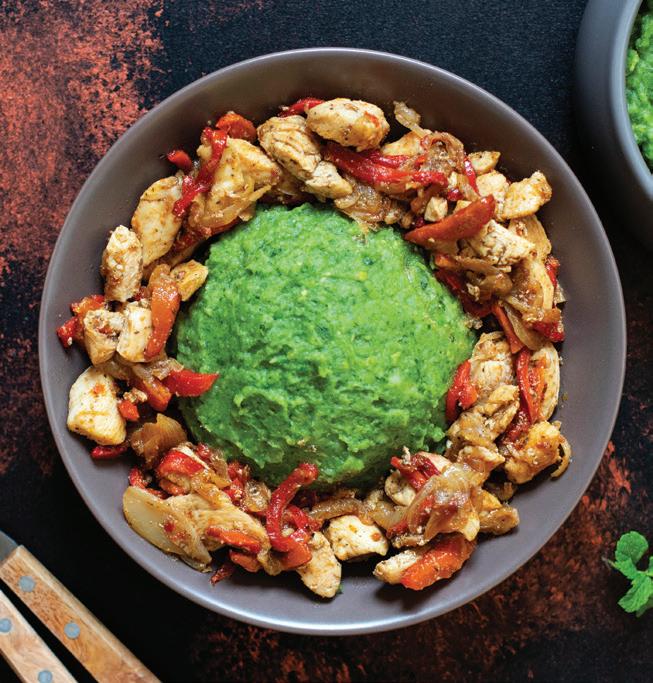
This recipe is part of a collection compiled by Salvation Army staff, personnel and volunteers to celebrate cultural diversity within the Salvos and in our communities.
Bible byte
On which page of this week’s Salvos Magazine is Tum-Tum hiding?
“For with God nothing will be impossible.” Luke chapter 1, verse 37 Revised Standard Version
14 14
SALVOS MAGAZINETASTE OF LIFE
Word Search Puzzle
Wordsearch




Words are hidden horizontally, vertically, diagonally, forwards and backwards.
S T S L N L E H A S E G N A U W T M D A
C O U C O G T C P T R H L O H L Z G U E
S E N I W A W R N E P T P S T U B I H R
L D S R E C I T T S L N N R H C M N L H
O O E W T N Y N I A W I W W G O D I O E
N S T S G A I R C O R N Y H I R W W Z E
R R T G S W E I D R W G E S O M D E T C


A S Y W G T P H E O W A T R T U E E R A
I E S T E O H M O I R U R H O R S S P A


N T V E R C M U N R R T G L B E I R E E
E N I T G U L D N E M U C S C Y R F E S
L R U U S F A E T D O M L O L S N R O I
R O I U P D L O C R E N T O D B U Y W G
T G F N T O U E D N C R L U D H S P S B
Funny things kids say

The term of


These daydreaming, and while the exact cause scientists believe that light, more exercise and more bare hormone
Tum-Tum:ishidingunderthebenchonthecover
Answers:1.SpringEquinox.2.Thesun shiftsovertheequator.3.Persiannew year.4.Daffodils,dandelions,lilies,tulips, irisandlilacs.5.BenjaminFranklin.

Solve A I A I S L S T T T S E E G D W L H R S H T S L T O I V D P W A E H E R S I R S M R H I O D
15 TAKE FIVE
Enjoy! Autumn Blustery Breeze Cloud Cloudy Cold Downpour Drought Dry Fog Heat Humidity Lightning Moisture Overcast Pressure Rain Shower Snow Spring Summer Sunrise Sunset Thunder Tropical Weather Wind Winter
‘spring fever’ refers topsychological and physiological symptomsassociated with the arrival
spring.
symptoms include restlessness and
is unclear,
increased
skin influence
levels. The biggest spring allergy trigger is pollen.
the following puzzle by finding all the hidden words! N T S A C R E V O O W O N T Y E E N D A U A Y W N S T I S Y E T U U T R B S E H A W I Y
R E
C R W U P
C
L O I D D D H
U
Z R A U D U
U
R
R H O A O S
Words List Autumn Blustery Breeze Cloud Cloudy Cold Downpour Drought Dry Heat Humidity Lightning Moisture Overcast Pressure Rain Shower Snow Spring Summer Sunrise Sunset Thunder Tropical Weather Wind Winter “Mummy, I love you all the way to Canis Majoris [largest known star].” Four-year-old: “Can we get a kitten?” Mum: “I’m allergic. I can’t be in the same house as cats.” Four-year-old: “You could sleep outside.” “When I get out of timeout, I will enjoy the rest of my life.” “What’s the password to the microwave?” 10 S EPTEMBER 2022


